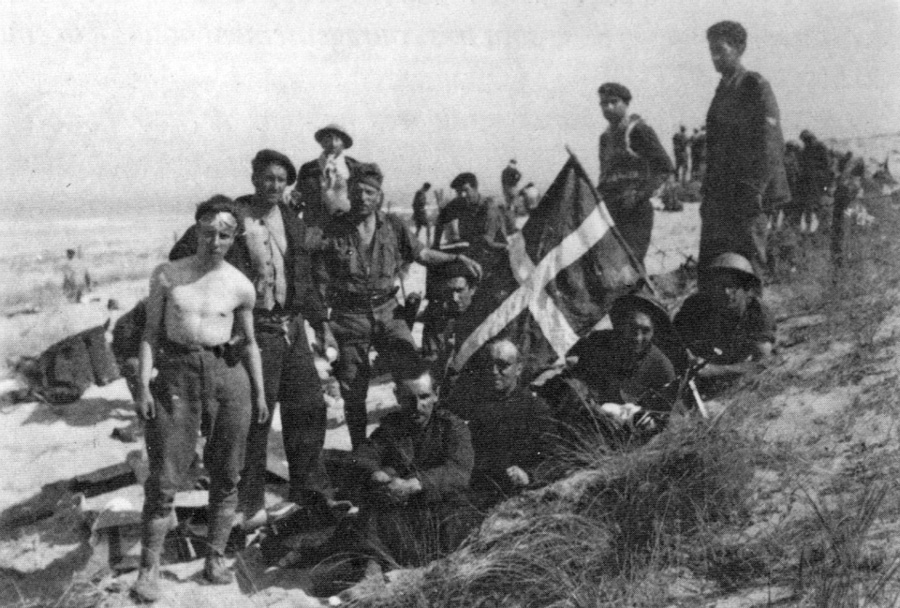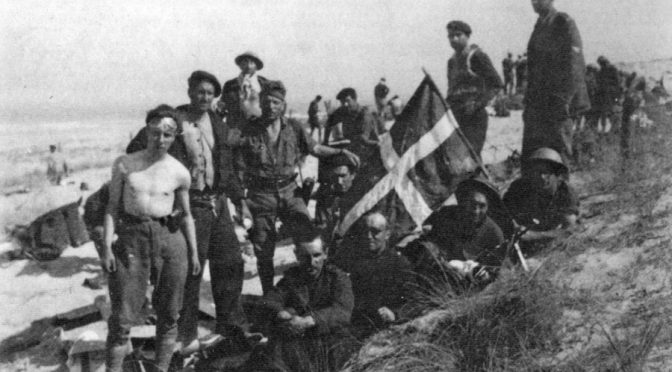In collaboration with Pedro Oiarzabal and the Sancho de Beurko Association, I’ve been translating some of their articles in the Fighting Basques series. These articles summarize their research into the contributions of Basques during World War II, often focusing on the role of Basque-Americans. One of the most distinguished contributions came from the Gernika Battalion, a collection of Basque veterans and new comers that fought near the end of the war on the front lines who played a key role in the Battle of Pointe de Grave.

- There had been an attempt to create a Basque combat unit earlier in the war. In 1941, the National Council of Euskadi, formed at the break up of the Basque government-in-exile, tried to create the 3rd Battalion of the Basque Naval Fusiliers. However, a lack of volunteers and opposition from the British government — a consequence of pressure from Spanish authorities — led to the almost immediate dissolution of the 3rd Battalion in 1942.
- By the end of 1944, the situation was different. The Germans had been defeated at Normandy and retreated from most parts of France. The time was ripe for a new attempt at a Basque combat unit and, in 1945, the Gernika Battalion was born. With connections to Kepa Ordoki‘s Basque Brigade, it consisted of veterans of the Spanish Civil War and previous battles with the Nazis as well as new recruits.
- The first action the Gernika Battalion saw was in the Battle of Pointe de Grave. Joining with Libertad battalion, they formed the 1st Battalion of the Foreign and Moroccan Mixed Regiment. On April 14, 1945, they attacked the German front, with the Gernika Battalion attacking hill 40. However, a heavy carpet of machine gun and rocket fire led to their retreat. What started off as 80 men was reduced to 52.
- A few days later, after the Gernika Battalion saw their kitchen blown up and had to dig trenches to spend the night on the beach, the Gernika Battalion, taking advantage of the German troops being distracted by Allied tanks, stormed the German trenches, providing a pivotal role in expelling the Germans from Montalivet. When General Charles De Gaulle arrived on the 22nd, he told Kepa Ordoki: “Commander, France will never forget all the efforts and sacrifices made by the Basques in the fight to free our country”
- On April 26, the anniversary of the bombing of Gernika, the Battalion marched through Bordeaux, the ikurrina displayed prominently in their formation. The Battalion received a total of ten war crosses for their “high moral and military value.” The Battalion was disbanded in September, 1945.
- Of about 80 men, 5 died and about 30 were wounded. They had walked nearly 20 kilometers, primarily along train tracks to avoid mine fields, but which led to exposure to German artillery. They captured between 200-300 prisoners during their efforts to take the Arros battery during the Battle of Pointe de Grave.
Primary source: Fighting Basques: Batallon Gernika.
Discover more from Buber's Basque Page
Subscribe to get the latest posts sent to your email.



Yep–I know about the Pointe de Grave! My Dad has joined the French Resistance–He never gave details about all the activities, what he did or where he went . He would say–” just in case the boches ( the German) come back in 20 years from now and we have to do the same thing over again.” But he always praised the fighters on the front line. We hid American, Canadian or British fallen airmen in the double ceiling of the barn.
The French Resistance was not a fighting unit–it was mostly sabotage, undercover work and such.
My Dad would only talk about the war with my uncle Luis. Uncle Luis fought during the Spanish Civil War against Franco. When any one walked in during their conversation, they would stop talking and change the subject.
Monique